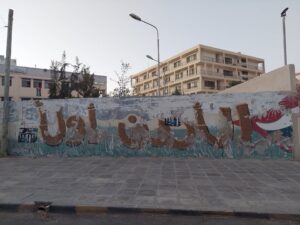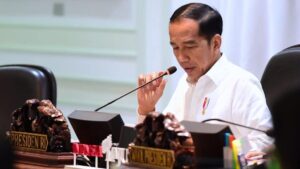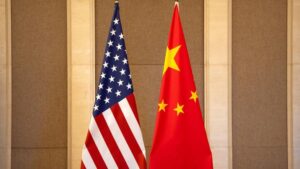PMSC: Capitalist Power in Contemporary Armed Conflict

Illustration. Credits: DangerTV
In the conception of the fourth generation warfare (Yuniasih & Hartono, 2013), there is an asymmetrical and psychological character in contemporary armed conflict which is dominated by the side of war between the government as the highest authority in the state and groups within the state society itself. Thus, the state no longer monopolizes and even dominates contemporary conflicts. Finally, the context of contemporary conflict also includes the difficulty of distinguishing between civil and military.
Private Military Security Company (PMSC) is basically a commercial company engaged in the military and security sector. PMSC is hired as a form of outsourcing for military and security needs which are not easy to obtain in terms of quality, quantity, or cost. PMSC, which is part of both civil and private companies, has become a new actor as a subject of international humanitarian law. The presence of this new actor not only invites discussion, but also debate regarding efforts to uphold international humanitarian law, especially since various humanitarian violations have occurred in conflict areas related to the existence of PMSC. Ideally, this actor should help the contractors who hire their services in order to stabilize security. However, this actor has also been proven to exacerbate conflict conditions by causing the death of civilians (Yuniasih, 2017).
With the inclusion of the PMSC in dealing with conflict, every PMSC’s actions are limited by several regulations. Regulations governing the actions of PMSCs include military regulations from countries of origin, contracting countries, and international law whereby PMSCs may shoot only in self-defence manners. However, in its implementation, the PMSC often fires first. Practically speaking, PMSCs do not have clear guidelines and work in a gray area. PMSC’s gray condition creates concern, especially in matters of military morale which are controlled by the private sector.
Ambiguous Relations between UN and PMSC
Relations between UN and PMSC are often ambiguous. Bures & Cusumano (2021) argues that there is organized hypocrisy between them. There are three points within their arguments. Firstly, the discrepancy between UN talk and action regarding PMSC is in danger of challenging the UN’s credibility as a norm employer. The use of PMSC by the UN can be seen as contrary to core norms within the UN body, such as self-determination, sovereignty, and anti-colonialism, thereby threatening the very existence of the UN.
Second, contradictions and ambiguities surrounding the UN’s use of PMSCs hinder the effectiveness of its agencies’ outsourcing practices. Strong criticism of the use of PMSC by the UN Working Group itself makes UN agencies tend to be embarrassed to make their practices transparent. Third, the overlap between the Working Group which continues to stigmatize the use of PMSCs and the widespread use of these actors may further delay reforms to peacekeeping efforts.
PMSC and Globalization: Threat of Capitalist Power
PMSC emerged as one of the conflict mediating actors. This is due to the emergence of globalization which blurs the boundaries between the government as the main holder of military power and civilians. In the findings of Haridha, Kusumawardhana, & Firjatullah (2019) there are various factors that underlie the rise of PMSCs after globalization. First, during the Cold War era there was an arms race between the western and eastern blocs which had a broad impact on increasing the number of military personnel in these countries so that there was little need for PMCs.
The second is a shift in the focus of conflict which during the Cold War focused on conflicts between states to conflicts between state with separatist and terrorist groups as well as civil wars. The third factor is the increasing number of companies supporting the military sector which are undergoing privatization so that they are considered more effective and efficient if the handling is handled by the private sector. PMSC presence can also be referred to as the intervention of capitalist forces in the constellation of world security. The problem with capitalization in this field is the commodification of humanity obligations. As a capitalist, of course corporate will prioritize the interests of contractors and ignore the problems of affected local communities.
PMSC Lacking in Accountability and Morality
The existing international legal regime does not provide sufficient broad accountability for PMSCs. Among conflicting parties, the UN typically divides between regular armies and other non-regular combatants. However, the corporate and more dynamic nature of PMSCs makes accountability harder. This is particularly true in the lack of mechanisms in international humanitarian law to assign responsibilities to states and other entities at significant points of PMSCs and personnel interactions with states and individuals so it is necessary to highlight the international and domestic law to be more comprehensive (Huskey, 2012).
PMSC also does not derive its coercive power from any legitimacy nor morality. States possesses coercive power due to a legitimate social contract with its citizens, while typical rebel groups would at least claim some moral standing. PMSC makes no claims of legitimacy and morality. The capitalist power has found its explicitly coercive and immoral form with only two goals in mind: seeking monetary gains or changing the formation of security forces. The concept of a coalition of states and PMSCs, mechanisms, procedures and policies that integrate private sector interests into public and global security interests makes respect for human rights less relevant (Emilia & Khaira, 2013). This certainly does not reflect the morality upheld by the UN charter.
In conclusion, as the capitalist spirit seeps into every layer of society, it has also found its expression in a coercive form with no regard to morality. As PMSCs emerges in conflict sites around the globe, the current international law and international organizations are ill-equipped to deal with them. Therefore, regulations and commitments from the country of origin, the host country, the contracting country and the PMSC itself are needed to existing regulations so that international humanitarian law can be upheld.
Yosua Saut Marulitua Gultom is a student at Universitas Pembangunan Nasional Veteran Jakarta. He can be found on Instagram with username @yosua_s.mg





